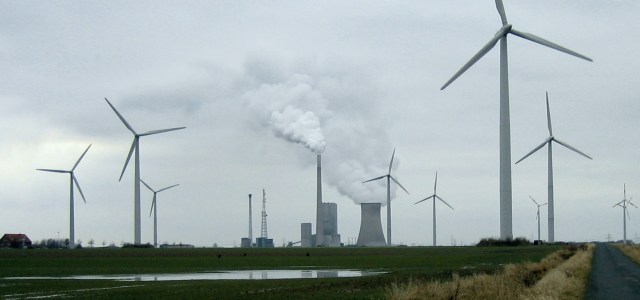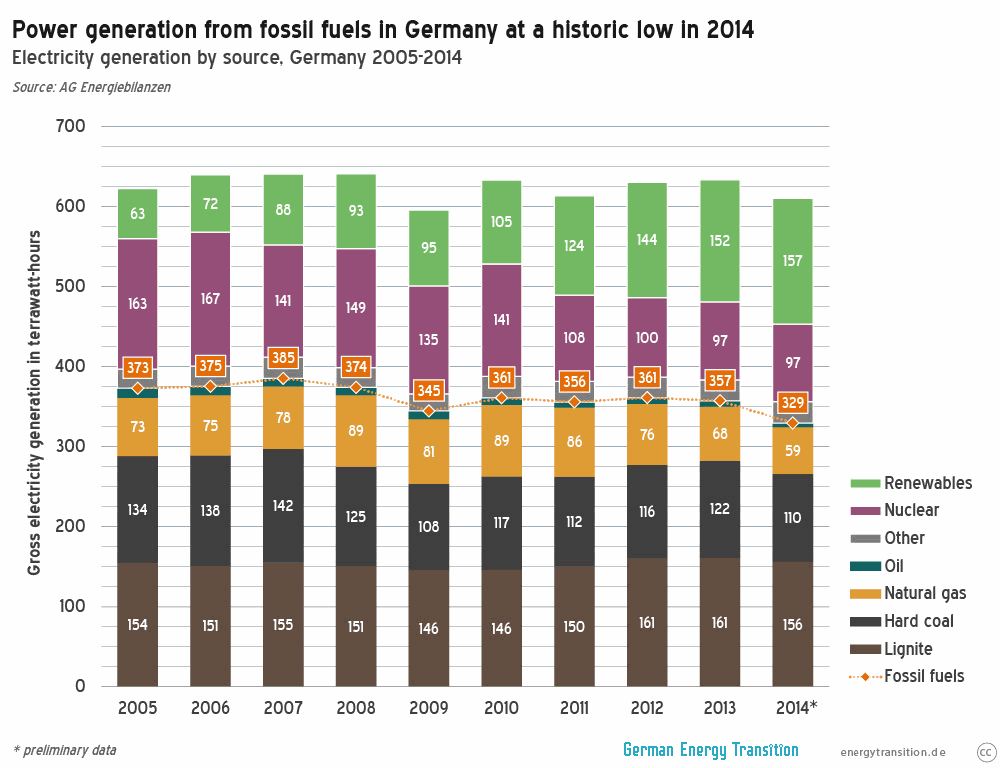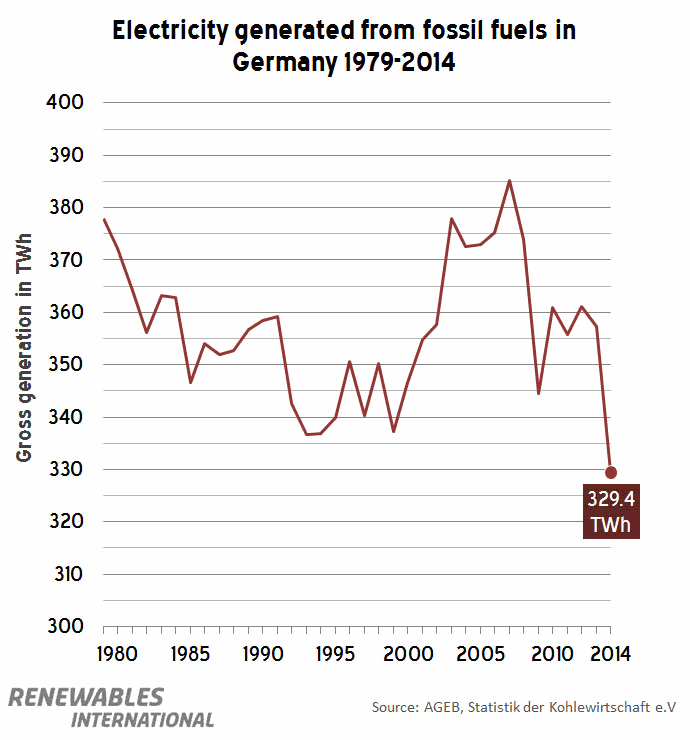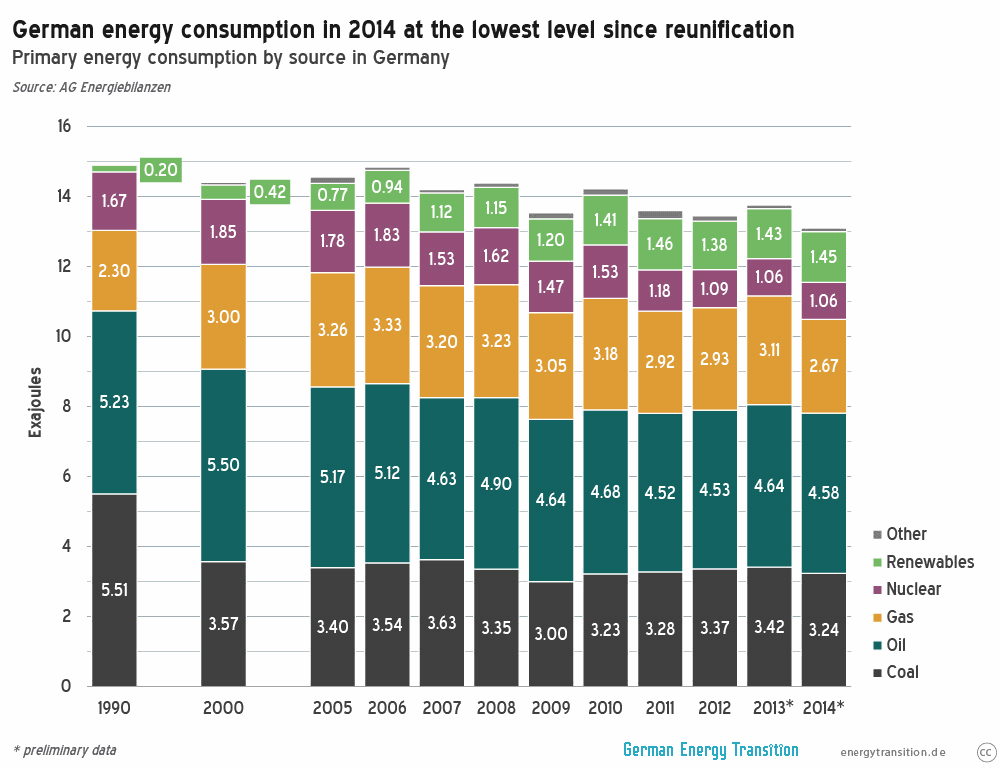Unofficial energy sector estimates for Germany for 2014 have rolled in over the past few weeks. Craig Morris provides an overview.

King Coal no longer rules in Germany. (Photo by Crux, CC BY-SA 2.5)
In 2014, German coal power production fell considerably year over year (see the table below) – and to the lowest level since 2011.
 One of the main headlines in the German press based on these figures is that renewables now represent the biggest single share of power supply, having nudged just ahead of lignite in second place (though some think the comparison is cheating because the two types of coal, hard coal and lignite, are listed separately, while renewables are put together). In 2014, renewables made up just under 26 percent of German power supply, up from 23.4 percent in 2013. At a continuous growth rate of two percentage points per year starting from 26 percent in 2014, Germany would reach its target of 80 percent renewable power in 2041 – nine years ahead of schedule.
One of the main headlines in the German press based on these figures is that renewables now represent the biggest single share of power supply, having nudged just ahead of lignite in second place (though some think the comparison is cheating because the two types of coal, hard coal and lignite, are listed separately, while renewables are put together). In 2014, renewables made up just under 26 percent of German power supply, up from 23.4 percent in 2013. At a continuous growth rate of two percentage points per year starting from 26 percent in 2014, Germany would reach its target of 80 percent renewable power in 2041 – nine years ahead of schedule.
Note also the dramatic decrease in power consumption at around minus four percent, with net power exports rising slightly to set yet another record for the third year in a row. The official explanation is that milder weather reduced power consumption, along with an economic decline in the chemicals sector. The recent economic sanctions against Russia have set back German industry, but the economy as a whole remains relatively strong, with unemployment still lingering at an all-time low since reunification. Quite possibly, a growing number of households are also consuming their own renewable electricity directly, and this consumption & production is not reflected in the figures.
When we add in the reduction in electricity from natural gas and oil, power from fossil fuels fell to a level not seen in the past 35 years (see graphic below). Gas consumption was down even more dramatically – 14 percent – due to milder weather (roughly half of German homes have gas-fired heating systems). As a result, Germany’s carbon emissions are expected to have fallen by around 4-5 % in 2014 alone.
 A view of total energy consumption (not just electricity) reveals a different picture, however.
A view of total energy consumption (not just electricity) reveals a different picture, however.
 Total energy consumption was also down – in fact, to the lowest level since reunification at the beginning of the 1990s. As a result, the share of nuclear power in energy consumption actually grew although slightly less nuclear power was generated. Likewise, consumption of petroleum in all energy sectors actually fell, but its share grew nonetheless.
Total energy consumption was also down – in fact, to the lowest level since reunification at the beginning of the 1990s. As a result, the share of nuclear power in energy consumption actually grew although slightly less nuclear power was generated. Likewise, consumption of petroleum in all energy sectors actually fell, but its share grew nonetheless.
Most of all, we clearly see that Germany is only making progress with renewables within the power sector, where it is clearly on target. In contrast, the share of renewables in total energy supply rose by only 0.7 percent last year. Starting at 11.1 percent in 2014, 0.7 percent growth means that Germany would not reach its target of 60 percent renewable energy by 2050, but rather after 2080. Clearly, we need to stop talking about just coal and focus more on oil, or start to more ambitiously include the transportation and heat sectors in the Energiewende.
Craig Morris (@PPchef) is the lead author of German Energy Transition. He directs Petite Planète and writes every workday for Renewables International.
Has the contribution of increased energy efficiency to reduced demand been analyzed?
Craig, thanks for this summary, especially the note on renewable electricity versus renewable energy. Germany does lack a renewable strategy in the thermal and transportation sectors, and it’s difficult to see that this will become an agenda topic for the current administration. Electrification and fuelcellification of the transport sector don’t see the attention that’s needed, and thermal energy consumption can’t only be addressed with weatherization programs – while less heat needs to be produces, more heat has to come from renewables. I’d love to know how if there are any indicators that this could become a topic for Mrs Merkel’s cabinet.
Germany needs to spend more money on updating it’s freight rail system, which would help spur more growth in neighboring countries.
The rail system is extremely outdated compared to the US which is the undisputed king of freight rail. From my research the average rail car in Europe weighs about 200,000 pounds or less, while here in the US the maximum limit is currently 286,000 pounds, and we are quickly shifting to 316,000 pounds.
The estimated costs in upgrading existing rail lines to higher weight limits is approximately 300,000 per mile here in the US, which would bring the total cost of upgrading our 30,000 miles of non-upgraded lines to about 9 billion dollars.
Germany embarking on such a reform would drastically reduce business costs associated with rail, as more goods could be shipped per train while reducing the amount of rail traffic and car congestion due to less trains. There is a huge efficiency gain to be made by moving to 316,000 pound lines in Europe by 100,000 pounds or more and would drive economic growth while reducing emissions and costs for businesses.
You forgot the export of fossil power to bordering countries: 35 TWh in 2014!!
Chris: Actually, Russia would strongly dispute the US’s claim to be “king” of freight rail. But the point stands; Germany’s freight rail system is not impressive compared to Russia’s either.
Autos, buses, and trucks will have to go electric; in most countries this is happening through pure market forces, but Germany seems to be lagging.
Energy efficiency is probably helping reduce demand: LED lighting cuts usage *massively*.